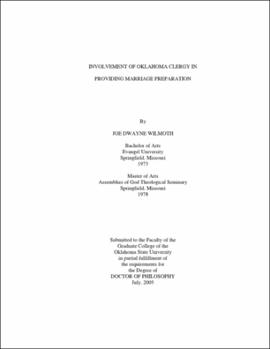| dc.contributor.advisor | Fournier, David G. | |
| dc.contributor.author | Wilmoth, Joe Dwayne | |
| dc.date.accessioned | 2013-12-10T18:04:22Z | |
| dc.date.available | 2013-12-10T18:04:22Z | |
| dc.date.issued | 2005-07 | |
| dc.identifier.uri | https://hdl.handle.net/11244/7714 | |
| dc.description.abstract | Scope and Method of Study: The purpose of this study was to learn about current practices and attitudes of Oklahoma clergy related to marriage preparation, including their perceptions of constraints to clergy involvement in providing effective marriage preparation. A 4-page questionnaire was mailed to clergy at 2,501 randomly selected churches in Oklahoma. | |
| dc.description.abstract | Findings and Conclusions: Although individual circumstances vary widely, a "typical" respondent to the survey is a 51-year-old male in his first marriage. He has served 22 years as a minister, about 6 years in his current position, which is senior pastor of an evangelical Protestant congregation with 140 active participants. He is most likely to have earned a master's degree, which included a course or two in counseling and a course in marriage and the family. He has attended a few seminars or continuing education events to stay equipped for ministry to couples and families, and he probably performs one or two weddings each year. A heuristic model of hindrances to effective marriage preparation conceptualized constraints as coming from several systems in which the clergyperson is embedded. Factors related to each of the following systems had significant correlations with the clergyperson's perception of effectiveness: premarital couple system, denominational system, congregational system, and the clergyperson's own marital system. Clergy generally believe the marriage preparation they provide is beneficial, but they recognize the need for more training. More than half said they would probably attend a 3-day seminar to learn how to present PREP (Prevention and Relationship Enhancement Program) workshops, and more than three-fourths said they probably would be willing to attend a 1-day workshop to learn how to use a premarital assessment in marriage preparation. An ABC-X Model of Marriage Preparation proposed by the author was consistent with findings from the study, indicating that the relationship between the marriage preparation process and outcome (perceived effectiveness) is mediated by the resources available and the personal meaning or importance the respondent attached to marriage preparation. | |
| dc.format | application/pdf | |
| dc.language | en_US | |
| dc.rights | Copyright is held by the author who has granted the Oklahoma State University Library the non-exclusive right to share this material in its institutional repository. Contact Digital Library Services at lib-dls@okstate.edu or 405-744-9161 for the permission policy on the use, reproduction or distribution of this material. | |
| dc.title | Involvement of Oklahoma clergy in providing marriage preparation | |
| dc.contributor.committeeMember | Fuqua, Dale R. | |
| dc.contributor.committeeMember | Hendrix, Charles C. | |
| dc.contributor.committeeMember | Hubbs-Tait, Laura | |
| osu.filename | Wilmoth_okstate_0664D_1439.pdf | |
| osu.accesstype | Open Access | |
| dc.type.genre | Dissertation | |
| dc.type.material | Text | |
| thesis.degree.discipline | Human Environmental Sciences | |
| thesis.degree.grantor | Oklahoma State University | |
